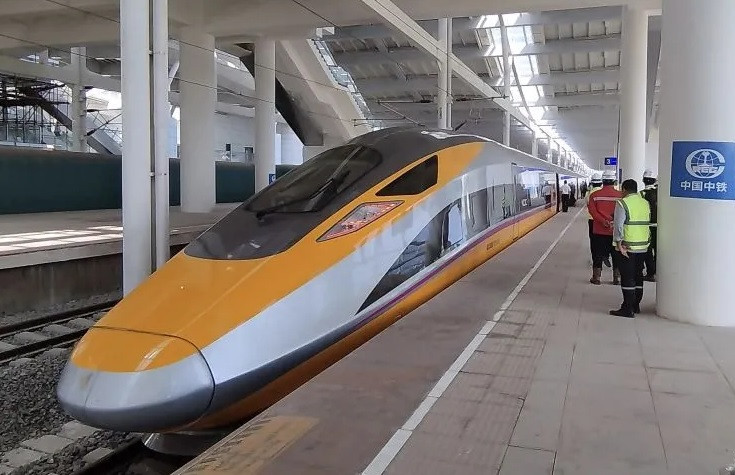Popular Reads
Top Results
Can't find what you're looking for?
View all search resultsPopular Reads
Top Results
Can't find what you're looking for?
View all search resultsHigh-speed rail project delayed once again
Free trial run now expected to begin in early September.
Change text size
Gift Premium Articles
to Anyone
O
perators of the Jakarta-Bandung high-speed railway have announced yet another delay of the flagship project’s soft launch to early September, citing the need to ensure preparedness and safety.
The announcement means trains will not start running on Aug. 18, which was supposed to mark the beginning of a public free trial.
“As the first high-speed rail link in ASEAN, operating the train requires very careful preparation. All aspects will be prepared properly to prioritize customer safety,” PT Kereta Cepat Indonesia China (KCIC) spokeswoman Eva Chairunisa said in a statement on Monday.
The KCIC is the Jakarta-based Indonesian-Chinese consortium responsible for the high-speed railway project.
This is in line with Deputy State-Owned Enterprises (SOEs) Minister Kartika Wirjoatmodjo’s statement on July 31 that President Joko “Jokowi” Widodo would ride the train for the first time on Sept. 1 and officially inaugurate it five days later in a bilateral event with China.
That would leave less than a month before the planned commencement of commercial operations on Oct. 1.
Prior to the announcement, the KCIC asked the government to consider granting the company a “temporary operating license” to launch operations on Aug. 18, according to a mid-July document seen by The Jakarta Post.
Experts queried by the Post said they had never heard of such a permit and urged the government to stick with the actual procedure and postpone the free trial for the sake of safety.
Government Regulation No. 33/2021 and its implementing regulation also make no mention of a “temporary” permit. To obtain the permit, operators are required to put in place safety procedures, manpower certifications and maintenance systems, among many other perquisites.
“I disagree with the word ‘temporary’ here. We are still not accustomed [to this new technology],” Aleksander Purba, a transportation analyst at Lampung University (Unila), told the Post on Saturday.
“If audits and certifications are not done by Aug. 18, then it would be best to [delay the start of operations],” he said, emphasizing that permits should only be issued after the assurance of safety.
He added that the government ought to consider forming a specialized agency to handle and coordinate tasks related to the railway, such as certification and testing, similar to how the Japan Railway Construction, Transport and Technology Agency (JRTT) handled the Shinkansen railway project in Japan.
Sutanto Soehodho, a transportation analyst at the University of Indonesia, told the Post on July 31 that a temporary permit would demonstrate that the project could be finished on time, but the reality was that work was still in progress and the rail link was far from complete.
Even small mistakes could be fatal and any incident could keep the public from using the trains, he warned, adding that that could affect the sustainability of the project.
Indonesia and China have committed to an all-out effort to ensure high-quality standards for the railway, according to a statement published by the Chinese Foreign Ministry on July 27, following President Jokowi’s two-day visit to the country.
Risal Wasal, railway director general at the Transportation Ministry, stressed that the prevailing regulation recognized no such thing as a temporary permit. He told reporters on Friday that the ministry was still reviewing the project and would only issue a permit once the process was done.
Seperately, Risal said on Monday that the railway could not be launched without an operating permit, including for the free trial, as quoted from Tempo.
The KCIC did not immediately respond when asked for comment about a temporary permit, but the KCIC’s Eva said in a statement the company would comply with all of the certification procedures required by the ministry.
Previously, experts told the Post that certification took up to two months for conventional rail services and could take longer for high-speed services.
Aditya Dwi Laksana, who heads the railway forum of the Indonesia Transportation Society (MTI), suggested that the government not rush the project as a high-speed rail link was still a novelty for Indonesia and the ministry did not have adequate experience with it.
“If the process still needs time, then it does not have to [be operational] on Aug. 18, or even in October,” he told the Post on Aug 1.
Aside from the certification issue, the government has stated that passengers on the new high-speed rail link will not be able to use Karawang Station in the early phase of operations, because while the station is almost completed, its road access is not.
State-owned Enterprises Minister Erick Thohir said on Monday that the government was focusing on finishing the construction of the stations at Padalarang and Tegalluar in Bandung regency.
In fact, access to all stations of the high-speed railway is far from done, according to a document seen by the Post in mid-July, which showed that progress on the construction of access to the stations of Karawang and Padalarang had reached only 6 and 5 percent, respectively, at the time.
KCIC spokeswoman Eva said there had been efforts to speed up work to meet the target but it would be done in accordance with the correct standards and procedures.
This would include ongoing construction work for stations such as Padalarang, which had reached 70 percent completion, she was quoted as telling Tempo newspaper on Monday.










